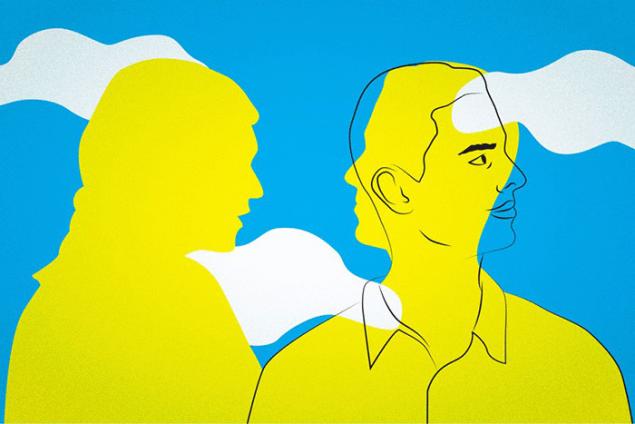473
Not bad for a dream: how dreams help the mind to work
Dreams and fantasies has never been considered a useful exercise, but recent studies in psychology show that they are very useful for emotional, intellectual and social life. Published translations of articles by leading psychologist at the University of Pennsylvania Scott Barry Kaufman, who talks about the real benefits of air castles.

© Lauren Giordano / The Atlantic
Habit to indulge in dreams often subjected to condemnation. The researchers, of course, and really tie the "attention gaps" with the memory lapses and depression, but there is a caveat: not all dreams create such gaps. Of course, when you need to pay attention to reality, your inner monologue is useful to mute. And yet, a significant part of our lives we spend alone with their own thoughts, fantasies and aspirations. It would be strange if a work of imagination, which we dedicate almost 50% of the life outside the dream state, was not adaptive.
Of course, when we talk about dreams, a major role is played by the context. A new approach to their study allowed to assert that such habits have many benefits, although they all depend on "what" is man, from the content of the dreams and individual differences. In other words, dreams can become a disruptive force or an invaluable source of support, depending on current goals (to listen to a boring lecture or to imagine the plot of the new novel), personality traits (neurotic — or the ability to be open to a new spiritual experience) and thoughts (passive aimless pondering — the formation of a positive attitude).
Many of us find it pointless annoying thoughts from which I want to get rid of. This may help-judgmental awareness — psychological practice, which allows you to see and accept the reality in all details. However, in reality most people dream of is not aimless — it is a way to cope with anxiety, to relax and to forget about the desired goals that have not yet been achieved. It is important that all these fantasies often include images of other people.
Psychologists at the University of Sheffield (UK) in the framework of a study recently found out that the process and the boundaries of goal setting most people have associated with life in society, including "love, intimacy and sexuality", and "friends and relations in the environment". But experts from the University of York (UK) found out: 73% of people tend to argue that the images of other often or always appear in their dreams. However, only in 1% cases the respondents stated that other people never become a part of their fantasies. Studies of the fundamental processes occurring in the brain, also confirms this correlation: according to scientists for the creation of dreams and the perception of other people answer the same zone.
All this cannot be called an accident. Professor of psychology at the University of Michigan (USA) Christopher Peterson in his works pointed out that other people "mean a lot to us in terms of our goals." Developed social relationships play an important role in the maintenance of health and the opportunity to lead happy, meaningful life. In fact, they are our fundamental driving force.
All of this raises one fascinating question: do we need real people that we felt someone else's influence? What is the contribution to our socio-emotional activities work with the imaginary reality of communication? After all, most of the day we usually spent in the active performance of social functions. Even if we have the opportunity to chat with colleagues, we can't be close to your loved one or loved ones. If the liaison has benefits for our mind, it encourages the habit of dreaming.
In its work experts from the University of Sheffield studied the impact of "public dreams" short-term feelings. Each participant scientists four times a day asked to talk about what is associated and not associated with other people fantasies arose in his last time. This gave the opportunity to assess what feelings they are associated, and to consider qualitative indicators of the relationship of man to his dreams.

© Lauren Giordano / The Atlantic
Psychologists have found that dreams relating to human relations, causing a sense of love and kinship and literally make people happy. But personal dreams are not provided to participants of this effect. The advantages of the dreams was directly connected with their contents: the researchers noticed that dreams about loved ones, important people are a real "conductor" of well-being. In fact, the increase in positive emotions was observed only when the imagination was connected to those who played in the lives of the subjects, a critical role.
This study was a continuation of the work in which British psychologists have tried to evaluate one of the most important aspects of the social community. They relied on the well-known fact that different forms of social interaction have differential effects on feelings and communication with loved ones entails more positive emotions. However, the experiment allowed to find out that even an imaginary interaction with these people evokes the same sense of love and kinship.
Fantasies of love, it seems, are adaptive strategy of regulating emotions, which allows to compensate for the isolation from the society in everyday life. "Imagination creates our everyday sensations associated with other people, say the researchers. — Of dreams and fantasy along with the reality of communication become a resource for the formation of positive emotions towards others".
This is consistent with the first study, which showed that the dreams of those who are far away, fueling the feeling of loneliness, while dreams of loved ones increase the feeling of satisfaction from life. In other work psychologists from the University of Sheffield noted that fantasies have other advantages: they alleviate the boredom, become a source of comfort in difficult moments, deepen learning ability and creative skills, help to create emotional strategies to overcome difficulties and to manage the negative feelings associated with the upcoming stress, ease the tension caused by unpleasant memories. And yet, the benefits of dreams is still mostly remained on the sidelines of human life in society. Maybe it's time to pay attention to them? published
P. S. And remember, just changing your mind — together we change the world! ©
Source: theoryandpractice.ru

© Lauren Giordano / The Atlantic
Habit to indulge in dreams often subjected to condemnation. The researchers, of course, and really tie the "attention gaps" with the memory lapses and depression, but there is a caveat: not all dreams create such gaps. Of course, when you need to pay attention to reality, your inner monologue is useful to mute. And yet, a significant part of our lives we spend alone with their own thoughts, fantasies and aspirations. It would be strange if a work of imagination, which we dedicate almost 50% of the life outside the dream state, was not adaptive.
Of course, when we talk about dreams, a major role is played by the context. A new approach to their study allowed to assert that such habits have many benefits, although they all depend on "what" is man, from the content of the dreams and individual differences. In other words, dreams can become a disruptive force or an invaluable source of support, depending on current goals (to listen to a boring lecture or to imagine the plot of the new novel), personality traits (neurotic — or the ability to be open to a new spiritual experience) and thoughts (passive aimless pondering — the formation of a positive attitude).
Many of us find it pointless annoying thoughts from which I want to get rid of. This may help-judgmental awareness — psychological practice, which allows you to see and accept the reality in all details. However, in reality most people dream of is not aimless — it is a way to cope with anxiety, to relax and to forget about the desired goals that have not yet been achieved. It is important that all these fantasies often include images of other people.
Psychologists at the University of Sheffield (UK) in the framework of a study recently found out that the process and the boundaries of goal setting most people have associated with life in society, including "love, intimacy and sexuality", and "friends and relations in the environment". But experts from the University of York (UK) found out: 73% of people tend to argue that the images of other often or always appear in their dreams. However, only in 1% cases the respondents stated that other people never become a part of their fantasies. Studies of the fundamental processes occurring in the brain, also confirms this correlation: according to scientists for the creation of dreams and the perception of other people answer the same zone.
All this cannot be called an accident. Professor of psychology at the University of Michigan (USA) Christopher Peterson in his works pointed out that other people "mean a lot to us in terms of our goals." Developed social relationships play an important role in the maintenance of health and the opportunity to lead happy, meaningful life. In fact, they are our fundamental driving force.
All of this raises one fascinating question: do we need real people that we felt someone else's influence? What is the contribution to our socio-emotional activities work with the imaginary reality of communication? After all, most of the day we usually spent in the active performance of social functions. Even if we have the opportunity to chat with colleagues, we can't be close to your loved one or loved ones. If the liaison has benefits for our mind, it encourages the habit of dreaming.
In its work experts from the University of Sheffield studied the impact of "public dreams" short-term feelings. Each participant scientists four times a day asked to talk about what is associated and not associated with other people fantasies arose in his last time. This gave the opportunity to assess what feelings they are associated, and to consider qualitative indicators of the relationship of man to his dreams.

© Lauren Giordano / The Atlantic
Psychologists have found that dreams relating to human relations, causing a sense of love and kinship and literally make people happy. But personal dreams are not provided to participants of this effect. The advantages of the dreams was directly connected with their contents: the researchers noticed that dreams about loved ones, important people are a real "conductor" of well-being. In fact, the increase in positive emotions was observed only when the imagination was connected to those who played in the lives of the subjects, a critical role.
This study was a continuation of the work in which British psychologists have tried to evaluate one of the most important aspects of the social community. They relied on the well-known fact that different forms of social interaction have differential effects on feelings and communication with loved ones entails more positive emotions. However, the experiment allowed to find out that even an imaginary interaction with these people evokes the same sense of love and kinship.
Fantasies of love, it seems, are adaptive strategy of regulating emotions, which allows to compensate for the isolation from the society in everyday life. "Imagination creates our everyday sensations associated with other people, say the researchers. — Of dreams and fantasy along with the reality of communication become a resource for the formation of positive emotions towards others".
This is consistent with the first study, which showed that the dreams of those who are far away, fueling the feeling of loneliness, while dreams of loved ones increase the feeling of satisfaction from life. In other work psychologists from the University of Sheffield noted that fantasies have other advantages: they alleviate the boredom, become a source of comfort in difficult moments, deepen learning ability and creative skills, help to create emotional strategies to overcome difficulties and to manage the negative feelings associated with the upcoming stress, ease the tension caused by unpleasant memories. And yet, the benefits of dreams is still mostly remained on the sidelines of human life in society. Maybe it's time to pay attention to them? published
P. S. And remember, just changing your mind — together we change the world! ©
Source: theoryandpractice.ru























